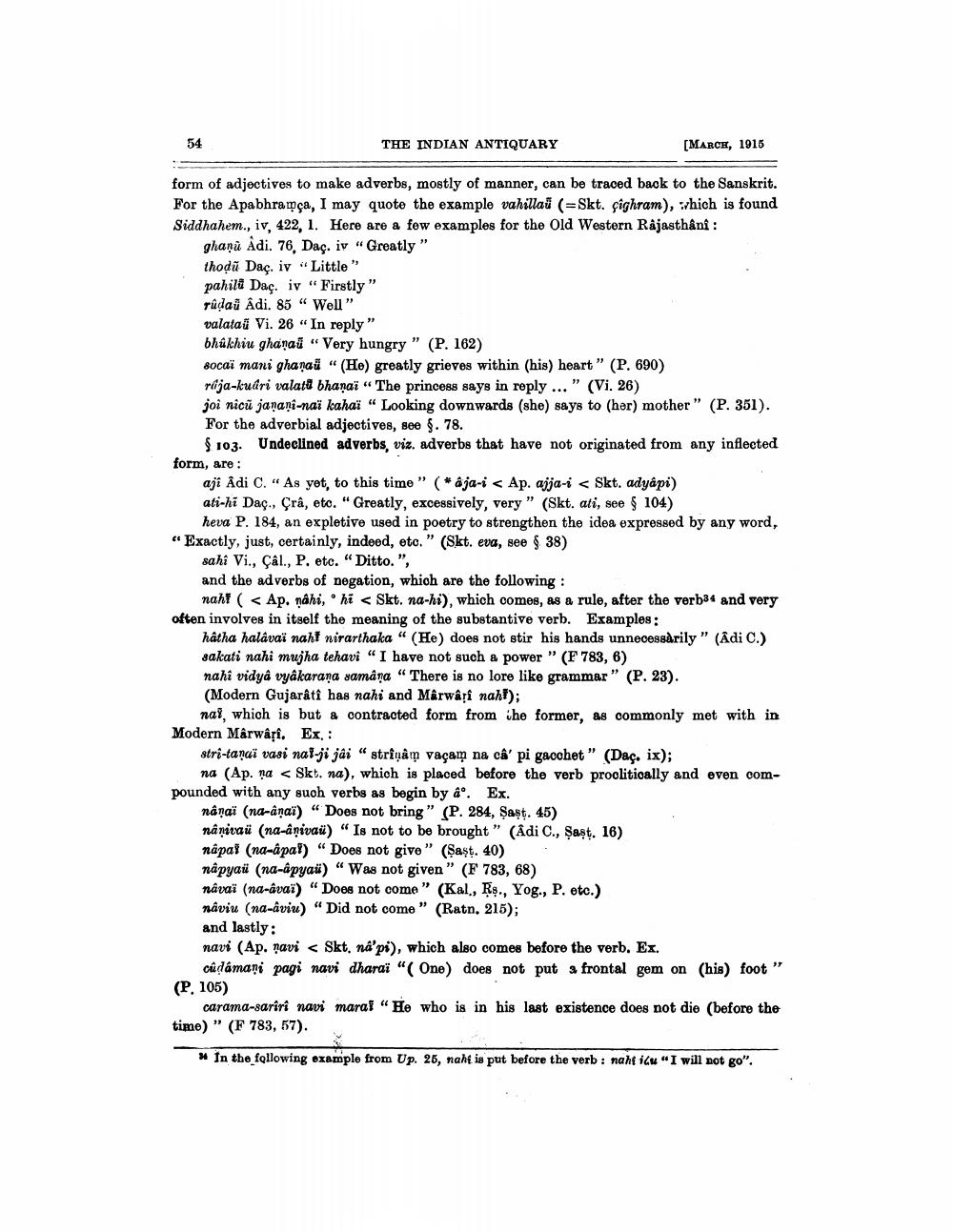________________
54
THE INDIAN ANTIQUARY
[MARCH, 1915
form of adjectives to make adverbs, mostly of manner, can be traced back to the Sanskrit. For the Apabhramça, I may quote the example vahillau (=Skt. çighram), which is found Siddhahem., iv, 422, 1. Here are a few examples for the Old Western Rajasthani :
ghaņu Adi. 76, Dac. iv "Greatly" thodū Dac. iv "Little" pahild Dac. iv "Firstly" rúdai Âdi. 85 “ Well" valatai Vi. 26 "In reply" bhůkhiu ghanai “Very hungry" (P. 162) socaï mani ghanai " (He) greatly grieves within (his) heart" (P. 690) rija-kuäri valati bhanai « The princess says in reply ..." (Vi. 26) joi nicũ janani-nai kahaï " Looking downwards (she) says to (her) mother" (P. 351). For the adverbial adjectives, see $. 78.
$103. Undeclined adverbs, viz. adverbs that have not originated from any inflected form, are:
aji Adi C. “As yet to this time" (*aja-i < Ap. aija-i < Skt. adyapi) ati-hi Daç., Çra, eto. "Greatly, excessively, very" (Skt. ati, see $104)
heva P. 184, an expletive used in poetry to strengthen the idea expressed by any word, "Exactly, just, certainly, indeed, etc." (Skt. eva, see $38)
sahi Vi., Çal., P. etc. "Ditto.", and the adverbs of negation, which are the following:
nahi ( < Ap. nahi, hi < Skt. na-hi), which comes, as a rule, after the verb34 and very often involves in itself the meaning of the substantive verb. Examples:
hatha halâvai naht nirarthaka“ (He) does not stir his hands unnecessarily" (Adi C.) sakati nahi mujha tehavi“I have not such a power" (F 783, 6) nahi vidya vyakarana samana “There is no lore like grammar" (P. 23). (Modern Gujarati has nahi and Marwâți naht);
nai, which is but a contracted form from the former, as commonly met with in Modern Mârwâți. Ex.:
stri-tanai vasi nal-ji jäi "strinâm vaçam na câ' pi gaochet" (Daç. ix);
na (Ap. na < Skt. na), which is placed before the verb proclitioally and even compounded with any such verbs as begin by do. Ex.
nânaï (na-anai) “Does not bring" (P. 284, Şast. 45) nânivaü (na-anivaü) "Is not to be brought " (Adi C., Şast. 16) napat (na-apal) “Does not give" (Sast. 40) napyaü (na-apyaü)“ Was not given" (F 783, 68) navai (na-avai) "Does not come" (Kal., Rş., Yog., P. etc.) naviu (na-âviu) "Did not come" (Ratn. 215); and lastly: navi (Ap. navi < Skt, nå'pi), which also comes before the verb. Ex.
cúdámani pagi navi dharai "( One) does not put a frontal gem on (his) foot" (P. 105)
carama-sariri navi maraf "He who is in his last existence does not die (before the time)" (F 783, 57).
* In the following example from Up. 26, naht is put before the verb: nahi ilu "I will not go".




